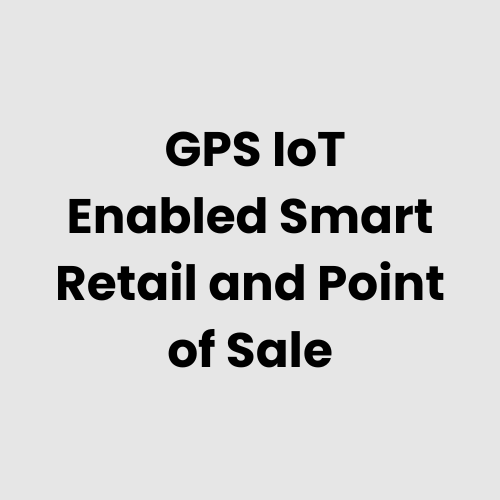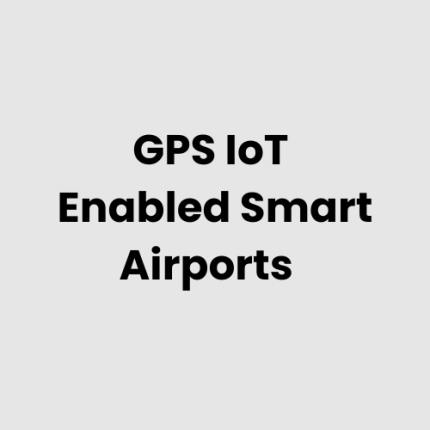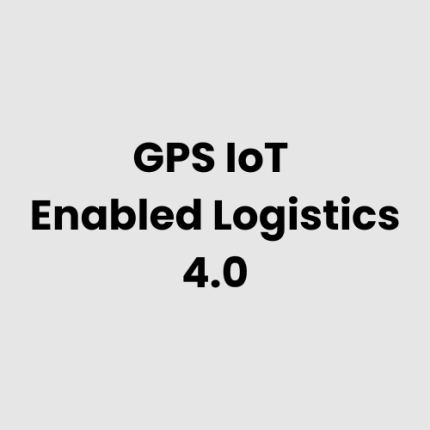Description
Technical Architecture of GPS IoT Enabled Smart Retail and Point of Sale
The GPS IoT Enabled Smart Retail and Point of Sale system consists of integrated hardware and software components designed to offer efficient management of retail operations, point of sale (POS) transactions, and inventory tracking. The technical architecture is built around an interconnected system of sensors, RFID tags, GPS units, IoT devices, and cloud-based or local servers. The system captures real-time data from customer interactions, products, and store operations, providing actionable insights that enhance store management and customer experiences.
Key components of the architecture include:
- IoT Sensors: Embedded in various devices throughout the store, including shelves, product tags, and security cameras, these sensors track product movement, customer behaviour, and store conditions (temperature, humidity, etc.).
- GPS Modules: Integrated into mobile devices, handheld scanners, and even delivery vehicles for precise location tracking.
- Point of Sale (POS) Terminals: Connected with the central database, facilitating real-time sales data capture and transaction processing.
- Cloud Integration: Collects data from the store and analyses it in real-time for inventory management, customer preferences, and sales trends.
- Mobile App Integration: Allows for customer interaction with the store through apps for promotions, loyalty programs, and purchasing.
Hardware of GPS IoT Enabled Smart Retail and Point of Sale
The hardware for this system is designed to provide seamless connectivity and data processing across multiple channels of the retail environment. The key hardware components include:
- POS Terminals: Devices for handling customer purchases, integrated with inventory systems and real-time transaction data.
- RFID Tags and Readers: Used for tracking inventory in real-time across the store, providing accurate stock levels and reducing shrinkage.
- IoT Sensors: Motion, temperature, and pressure sensors that track product locations, customer movement, and environmental conditions.
- GPS Modules: For real-time tracking of deliveries and in-store assets, ensuring operational efficiency.
- Mobile Devices/Tablets: Handheld devices used by store staff for inventory management, assisting in checkout processes, and offering customer service.
- Beacons: Used for proximity marketing, sending personalized offers to customer smartphones based on their location within the store.
- Cameras: Smart cameras integrated with AI to monitor customer behaviour, enhance security, and analyse shopping patterns.
Physical Placement Considerations of the Hardware
Strategic placement of hardware is crucial for the effective operation of the GPS IoT Enabled Smart Retail and Point of Sale system. The following placement considerations must be accounted for:
- POS Terminals: Should be located at customer checkout points to ensure easy access for both customers and sales staff. Multiple terminals should be placed in high-traffic areas for convenience.
- RFID Readers: Placed at entry/exit points and along key shelves for effective inventory management and theft prevention.
- IoT Sensors: Installed throughout the store, including shelves, aisles, and high-traffic areas, to collect real-time data on product movement, temperature, and customer flow.
- GPS Units: Embedded in delivery vehicles or hand-held devices used by store staff to track real-time movements of goods, deliveries, and in-store assets.
- Beacons: Placed at strategic points to provide customers with personalized offers based on their proximity to specific products or departments.
- Cameras: Positioned at high vantage points for monitoring store traffic and customer behaviour.
Hardware Architecture of GPS IoT Enabled Smart Retail and Point of Sale
The hardware architecture is designed to ensure seamless communication between the various components of the system. It consists of:
- Front-End Devices: POS terminals, mobile devices, RFID tags, and sensors act as input/output devices that communicate directly with the system’s servers.
- Backend Servers: A robust server infrastructure stores transactional data from POS terminals, inventory updates from RFID, and real-time insights from IoT sensors and GPS modules.
- Cloud Platform: This acts as the central data hub, receiving and processing all information, and allowing for remote management, updates, and scalability.
- Communication Protocols: The system uses Wi-Fi, Bluetooth, and cellular communication protocols to transmit data between hardware components and servers, ensuring constant connectivity.
Deployment Considerations of GPS IoT Enabled Smart Retail and Point of Sale
Successful deployment of the GPS IoT Enabled Smart Retail and Point of Sale system involves several key considerations:
- Scalability: Ensure that the system can scale according to the size of the retail environment, whether it’s a single store or a chain of locations.
- Security: Implement encryption and security protocols to safeguard customer data, transaction information, and inventory.
- Connectivity: Maintain a reliable network infrastructure to support the constant flow of data from IoT devices, POS systems, and cloud platforms.
- System Integration: The system must integrate with existing retail management software, such as inventory systems, customer relationship management (CRM) tools, and accounting software.
- Training and Support: Retail staff should be adequately trained on how to use the system, including troubleshooting common issues.
- Maintenance: Regular monitoring of hardware and software performance ensures that issues such as device malfunctions or software errors are promptly addressed.
Relevant Industry Standards and Regulations
- PCI DSS (Payment Card Industry Data Security Standard)
- GDPR (General Data Protection Regulation)
- ISO 27001 (Information Security Management)
- ISO 9001 (Quality Management)
- ISO/IEC 11801 (Standard for Cabling and Network Infrastructure)
- HIPAA (Health Insurance Portability and Accountability Act) – If applicable
- FCC Regulations (for wireless communication)
Local Server Version
For retail businesses that require in-house control, the GPS IoT Enabled Smart Retail and Point of Sale system can be deployed on a local server. This version allows for:
- Full control of retail operations without relying on external cloud services.
- Faster data processing and local storage of sensitive data.
- Greater security with physical control over hardware and network infrastructure.
- Less dependency on internet connectivity for day-to-day operations, though cloud-based backups are still recommended for disaster recovery.
Cloud Integration and Data Management
Cloud integration is a crucial component for enabling real-time data sharing, advanced analytics, and remote management. The GPS IoT Enabled Smart Retail and Point of Sale system can integrate seamlessly with cloud services to:
- Store Data: Transaction data, customer profiles, and inventory logs can be securely stored in the cloud for easy retrieval and analysis.
- Advanced Analytics: Leverage cloud-based tools to perform real-time analytics, helping retailers understand sales trends, customer preferences, and inventory needs.
- Remote Management: Retail managers can monitor store performance, manage inventory, and view analytics remotely through cloud-based dashboards.
- Scalability: The cloud infrastructure ensures that the system can scale across multiple locations without heavy upfront investments in local servers.
At GAO Tek Inc., we provide cutting-edge solutions for GPS IoT Enabled Smart Retail and Point of Sale systems, supporting businesses in enhancing operational efficiency, improving customer experiences, and gaining deeper insights through real-time data analytics. We have the expertise and resources to assist you in deploying and optimizing these systems, ensuring seamless integration and reliable support.
GAO Case Studies of GPS IoT Enabled Smart Retail and Point of Sale
Here are some key case studies of GPS IoT Enabled Smart Retail and Point of Sale solutions deployed across the USA and Canada. These case studies highlight how businesses in various cities have leveraged GAO Tek’s advanced technologies to enhance their retail operations, improve customer experiences, and optimize inventory management.
United States Case Studies
- New York, NY
A high-end department store in New York implemented the GPS IoT-enabled retail system to optimize its point of sale and inventory management. By integrating IoT sensors and RFID tags, the store saw a significant reduction in stock discrepancies and improved checkout speed. - Los Angeles, CA
A leading fashion retailer in Los Angeles used a GPS IoT-enabled POS system to track real-time customer behaviour and purchase patterns. The system provided tailored marketing insights, boosting both customer engagement and sales through personalized promotions. - Chicago, IL
A retail chain in Chicago implemented an advanced GPS-based system to manage inventory across multiple store locations. This enabled seamless stock tracking, reducing overstock and understock situations while improving overall operational efficiency. - Houston, TX
A grocery chain in Houston adopted a GPS IoT-enabled retail system to streamline its supply chain and improve stock management. The system provided real-time location tracking of delivery trucks, ensuring that the store received fresh stock on time and in optimal condition. - Miami, FL
A large electronics retailer in Miami used the GPS IoT solution to enhance its in-store shopping experience. The system’s real-time tracking capabilities allowed customers to quickly find products in the store, while store staff could manage inventory more efficiently. - San Francisco, CA
In San Francisco, a global cosmetics retailer leveraged IoT-enabled POS terminals and real-time stock tracking to optimize its sales floor management. The system improved product placement, leading to increased sales during peak shopping hours. - Dallas, TX
A home improvement retailer in Dallas implemented a GPS IoT system for better asset management. The system provided real-time tracking of high-value equipment and tools in the store, reducing loss and improving inventory accuracy. - Washington, D.C.
A retail company in Washington, D.C. used IoT sensors and GPS-enabled devices to create a more efficient checkout process. The solution reduced wait times by enabling mobile checkouts and automated inventory updates in real-time. - Boston, MA
A premium clothing store in Boston deployed a GPS IoT-enabled system for inventory management and to enhance customer service. The integration of RFID tags and sensors improved stock visibility, helping staff restock shelves quickly during busy periods. - Phoenix, AZ
A specialty sports retailer in Phoenix used GPS and IoT technology to streamline its in-store customer engagement. The system provided personalized offers to customers based on their real-time location in the store, enhancing their shopping experience. - Atlanta, GA
A department store in Atlanta integrated a GPS IoT-enabled system to track customer movement patterns in the store. This data helped optimize store layouts and improve product placement, ultimately leading to increased sales and better customer satisfaction. - Seattle, WA
In Seattle, a large-scale retail chain used a GPS IoT system to integrate point of sale and inventory management. The real-time data allowed them to adjust stock levels and sales strategies more efficiently, reducing waste and enhancing customer experiences. - Denver, CO
A retail store in Denver utilized the GPS IoT-enabled system to offer a contactless payment solution. Through real-time data collection, the store could provide customers with personalized promotions and ensure efficient service at checkout. - Philadelphia, PA
A large retail establishment in Philadelphia deployed a GPS IoT-enabled POS system to track customer spending patterns and optimize its loyalty program. By leveraging real-time insights, the store increased customer retention and sales through targeted offers. - Minneapolis, MN
A chain of retail stores in Minneapolis implemented a GPS-based inventory management system to monitor stock in real-time across multiple locations. This allowed them to reduce overstocking and prevent stock outs, resulting in better inventory control.
Canada Case Studies
- Toronto, ON
A high-end electronics retailer in Toronto implemented a GPS IoT-enabled retail system to optimize product placement and improve sales performance. By tracking customer interactions and product movement, the store was able to deliver a personalized shopping experience that increased both foot traffic and conversion rates. - Vancouver, BC
A major clothing retailer in Vancouver integrated a GPS-based system to streamline their supply chain and improve in-store operations. The system provided real-time visibility into stock levels, allowing the store to better manage inventory, reduce waste, and optimize the customer experience.
These case studies showcase how businesses across the U.S. and Canada have benefited from GAO Tek’s GPS IoT Enabled Smart Retail and Point of Sale system. With our extensive experience in providing advanced B2B and B2G solutions, we ensure that retailers can improve operational efficiency, enhance customer experiences, and drive sales growth. GAO Tek continues to support leading businesses in North America, helping them stay ahead in a competitive retail market.
Navigation Menu for GPS IoT
- GPS IoT Trackers/Devices
- GPS IoT Tracking Accessories
- GPS IoT Tracking Resources
- GPS IoT – Cloud, Server, PC & Mobile Systems
Navigation Menu for IoT
- LORAWAN
- Wi-Fi HaLow
- Z-WAVE
- BLE & RFID
- NB-IOT
- CELLULAR IOT
- GPS IOT
- IOT SENSORS
- EDGE COMPUTING
- IOT SYSTEMS
Our products are in stock and can be shipped anywhere in the continental U.S. or Canada from our local warehouse. For any further information, please fill out this form or email us.
We are actively looking for partners who are like us located in the U.S. and Canada. For more information on partnering with GAO, please visit Partner with GAO Tek Inc. It lists various ways to partner with GAO, such as OEM Partnerships, Technology Integration, Distribution and Reselling Opportunities, Presenting at the Leading Event Tek Summit, Joint R&D Projects, Training and Consulting Services, Industry-Specific Collaborations, Research and Academic Partnerships.



